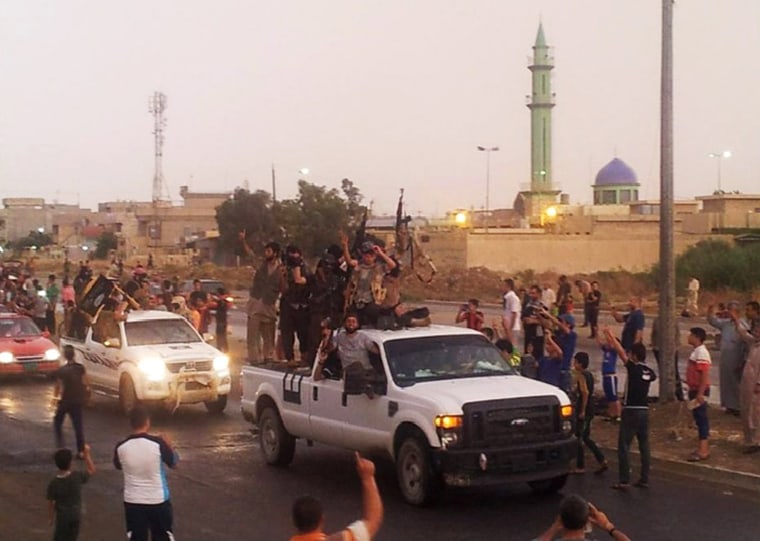When Sunni extremists seized control of Iraq’s second-largest city, many feared the militants would brutally brandish their new-found power and exert a reign of horror on the residents of Mosul.
One month later, it appears that most in the city are far from terrified, their biggest complaint a lack of electricity rather than explosive violence.
“We all thought ISIS fighters will hurt people, but they did not do so,” said shop owner Fahad, referring to militants from the Islamic State of Iraq and al-Sham (ISIS). “It is 100 percent safe here. The only thing we suffer from is the lack of public services.”
Sign up for breaking news alerts from NBC News
The shop owner's sentiments run counter to reports of brutality carried out by the militants elsewhere. As recently as Wednesday, Iraqi security forces found 53 corpses, blindfolded and handcuffed, south of Baghdad, Reuters reported.
The identity and sectarian affiliation of the dead people was not immediately clear, but the Sunni insurgents have boasted of killing hundreds of captive Shi'ite army troops after capturing the city of Tikrit on June 12. They put footage on the Internet of their fighters shooting prisoners.
ISIS overran Mosul two days before that fight, marking the first of many key victories for the fighters in a lightning offensive through Iraq. The assault triggered an exodus of refugees, with many Shiites fleeing northern Iraq amid fears of sectarian violence at the hands of the Sunni extremists.
While many Shiites left Mosul, those who stayed behind are being treated “just like Sunnis — in a very good way,” insisted Fahad, a 30-year-old Sunni who asked that NBC News only use his first name.
Fahad said he and others initially feared for the safety of their female relatives at the hands of the violent militants.
“We prepared to defend our houses and families, but after a while, we started to see the truth,” he said. “They did not rape a single woman, they did not force people to leave their houses and did not chase innocent people - except those who are wanted.”

Shortly after capturing Mosul, ISIS fighters roamed the city handing out leaflets warning residents away from smoking and drinking alcohol, and promising that lawbreakers would be dealt with under Islamic law, according to The Associated Press. Women also were told to stay home as much as possible.
But ISIS has largely held off on enforcing the group’s strict interpretation of Islamic law, according to residents.
“They announced that it is not allowed to smoke cigarettes and shisha, but in the evening, young men go to a park where they smoke shisha,” Fahad explained. “But, they removed all pictures of women away from the streets and markets,” taking down billboards and advertisements, he added.
ISIS met little resistance from Iraq's million-strong U.S.-trained army when the group launched its assault. Many soldiers fled their posts, shedding uniforms and weapons as they ran. Since then, the militants have given Iraqi soldiers the option to give up and repent for fighting against them, according to Fahad.
“They asked the soldiers in the beginning to give up, promising them that they will take their weapons and set them free,” Fahad said. “Some soldiers did that, and ISIS fighters kept their promise and set them free. For those soldiers who refused, they were killed."
The security forces under Iraq’s Shiite-dominated government have drawn repeated criticism for a heavy-handed approach that has alienated Sunnis – an experience echoed by Fahad.
“I prefer to live under the rule of ISIS,” he told NBC News.
After their initial embarrassing rout, the Iraqi security forces are trying to regroup and reclaim territory from the fighters.
When cellphone services dropped out last week, many Mosul residents thought warplanes might have targeted communication towers, according to Jamal, a Sunni journalist living in the city. Then news came in from the city’s big mosque: Abu Bakr al-Baghdadi, leader of ISIS, was there.
“After he finished the ceremony, he left the mosque, and nothing happened,” Jamal said. “After that, it was another normal day in Mosul.”
There are some signs in Mosul that ISIS is working to set up the infrastructure for its recently declared caliphate, or Islamic state.
The fighters have set up shop in empty houses and organized “interrogation departments” and prisons, Jamal said.
“They started to take former Iraqi high-ranking officers into unknown places,” he added. “There are rumors that they want those officers to help them in putting military plans to defend Mosul ... Still the reason behind taking those officers is unknown.”
"The city of Mosul now looks like a city of ghosts"
Still, he said the main improvements ISIS has made are the removal of cumbersome concrete blast walls and the opening up of previously closed-off streets.
“People here are living under difficult conditions, because of the lack of public services, especially power,” Jamal added.
One byproduct of the electricity cuts is that shop owners and market vendors have slashed prices of some items: there is no power to turn on their fridges and some food cannot be saved for the next day.
But many of Mosul’s residents held government jobs, according to Jamal, and since ISIS took over have not received their pay.
With no money to buy what they need, many Mosul residents have simply stopped going out, Jamal said.
“The city of Mosul now looks like a city of ghosts.”
The Associated Press contributed to this report.